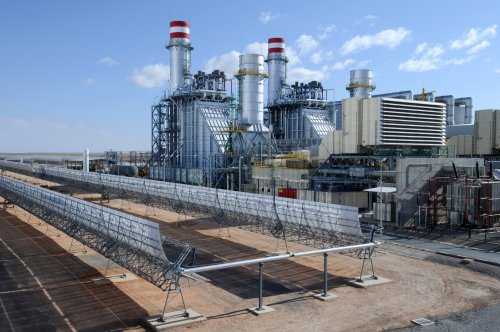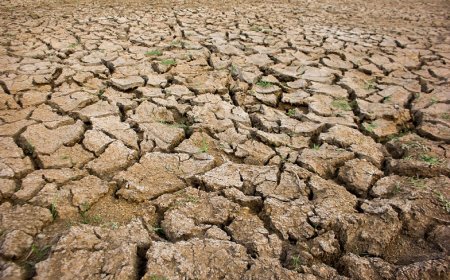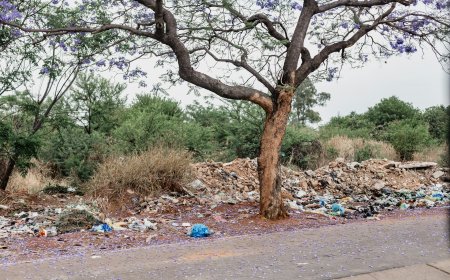This article is part of a series of special thought pieces that APRI is publishing in partnership with the African Climate Foundation in the run up to COP26 in Glasgow. The series is titled From Rio 1992 to COP26: Africa’s Climate Journey and the Road Ahead.
Highlights
- A just transition to a lower carbon economy must support Africa’s shift to higher value-added production and trade – long recognized as its key development challenge.
- This shift requires the continent to emerge as a manufacturer of green products and technologies and not just a consumer of commodities created elsewhere.
- Renewable energy plants and experiments with non-fossil-fuel-driven public transport vehicles are steps in the right direction.
- The African Continental Free Trade Area allows regional value chains to be established, which would support the manufacturing of lower carbon products on a larger scale and at more locations across the continent.
- “Climate proofing” infrastructure is both a necessity in view of the threat of extreme weather emergencies and a way of creating jobs.
- Realizing the potential of benefits from a transition to a low carbon economy will depend, in part, on transferring resources to support the creation of new production facilities..
- It will also require global trade and other regulations to provide “policy space” to support the creation of nascent industries.
- Premature trade liberalization and unilateral measures such as “border adjustment taxes” will impede such efforts.
- Africa urgently needs to develop its own perspectives and demands in campaigning for a Global Green New Deal.
The report of Working Group 1 of the United Nations Intergovernmental Panel on Climate Change (IPCC) released in August 2021 underlines the urgent need to expedite the transition to a lower carbon economy if catastrophic levels of global warming are to be avoided within as little as two decades [IPCC, 2021]. The same report inicates that, even if the political will to contain global warming to the 1.5°C target is mustered (a big IF), more extreme weather events, caused by the global warming already underway, are inevitable.
People in African countries have long been identified as among those most likely to be adversely affected by catastrophic climate change. Southern Africa, for example, is already experiencing a rise in average temperatures twice that of the global average, and most of the continent has already faced extreme weather emergencies either as drought or floods. African countries have thus consistently argued in support of “common but differentiated responsibilities” in undertaking necessary mitigation measures.
The more rapid transition to a lower carbon economy, called for by the United Nations, raises many questions for Africa. They include issues related to ensuring a “just transition” and managing “transition risks”. For South Africa alone, the cost of transitions allowing it to reach its Paris commitments have been estimated at around R 1.8 trillion in decommissioned assets, an amount equal to around 60% of its GDP [Huxam et al, 2019]. Ensuring a “just transition” is therefore critical to the continent’s ability to contribute to a more ambitious shift towards a lower carbon economy. A central element of this shift is ensuring that the continent benefits from the introduction of cleaner technologies and industries through jobs, industrial development and higher incomes. Without this insurance, the continent is set to become a net loser as its high carbon activities are shut down or frozen out, not just by its own commitments but also by the actions of its trading partners and export customers. This paper examines some of these issues as they relate to Africa. It argues that, for Africa, what will be critical is ensuring that it receives an equitable share of the potential developmental benefits arising from a transition to a lower carbon economy.
Ensuring that a transition to a lower carbon economy delivers an equitable share of the potential economic benefits to Africa will thus depend on the extent to which the continent is able to become a producer and not just a consumer of value-added lower-carbon-emitting technologies and products. These would include but are not limited to green energy technologies and components and electric or fuel-cell-driven vehicles.
Africa’s leadership has long argued that the continent’s underdevelopment is inextricably linked to its colonially-initiated integration into the global economy as a mere producer and exporter of primary products used in manufacturing processes elsewhere. Overcoming underdevelopment, accordingly, requires moving to higher value-added production and trade – following the path traversed by all other countries that have transitioned from “developing” or poor to “developed” or rich. The inequities associated with the distribution of Covid-19 vaccines have also highlighted the importance of reducing dependence on imported strategic products by promoting a greater decentralization of production to a greater number of locations.
There is no inherent reason why Africa needs to import rather than manufacture wind towers, blades and other components for the generation of wind energy, nor why it cannot manufacture solar water heaters, mirrors used in Concentrated Solar Power plants, photovoltaic cells and other components used in renewable energy generation. Indeed, some of these items are already being manufactured in some parts of the continent, even as many other countries import all they use from outside the continent. There is also no reason why motor assembly plants on the continent should continue to produce only fossil-fuel-driven vehicles when almost all car manufacturers are transitioning to electric vehicles. In South Africa, experimentation underway to develop public transport and underground mining vehicles driven by hydrogen fuel cells using platinum catalysts can potentially be upscaled.
The AfCFTA framework harbors immense potential for one or more regional value chains producing renewable energy or other green technology products. This potential, however, will not be realized automatically or inevitably. It will depend on purposeful action at national, REC (Regional Economic Community) and continental level.
The African Continental Free Trade Area (AfCFTA) has been identified as a key enabling mechanism in unlocking a large regional market that could underpin the emergence of regional value chains supporting a broad-based move to higher value-added production across the continent. If this market was to materialize, it would see a range of higher value-added products being manufactured in and drawing components from plants located in several countries and being consumed across the continent and exported. The AfCFTA framework harbors immense potential for one or more regional value chains producing renewable energy or other green technology products. This potential, however, will not be realized automatically or inevitably. It will depend on purposeful action at national, REC (Regional Economic Community) and continental level. The action will need to include deploying a range of industrial policy tools – including providing developmental finance and incentives, enforcing localization in public procurement and ensuring that the AfCFTA provides a real margin of preference for locally domiciled industries by rejecting calls for premature liberalization towards third parties.
At the same time, the inevitability of more extreme weather events outlined in the IPCC Working Group 1 report [IPCC, 2021] highlights the need for urgent and ambitious programs to build more resilient infrastructure, as well as make existing infrastructure sturdier. These programs would need to be shaped by scientific analysis of likely trends in different areas and regions. Those likely to experience more extreme flooding and storms need to ensure that roads and railways, housing and other infrastructure are robust enough to withstand such onslaughts. Some of the areas likely to become more water scarce need to be looking at projects to identify new water resources and conserve existing resources against waste and leakage. Coastal towns and cities need to identify their vulnerability to rising sea levels and embark, where possible, on defensive measures. Failure to act proactively to “climate proof” infrastructural assets and communities will mean having to respond post hoc to destruction caused by extreme weather events. Acting proactively can also create jobs and incomes in the construction and maintenance of infrastructure and be part of programs to recover from the Covid Great Lockdown recession.
Africa thus needs to approach COP 26 insisting on its right to become a producer of green technologies and products and not continue to be relegated to the role of being a mere consumer of goods produced elsewhere. At the same time, it needs to highlight the importance of being supported in adapting both to a lower carbon future and to the probability of having to confront extreme weather emergencies. Indeed, Africa’s ability to contribute its “common but differentiated responsibilities” will depend on the extent to which it is able to benefit from the potential jobs and developmental benefits of a “just transition” to a lower carbon world. Locking into this benefit will require meaningful commitments on real resource transfers, not vague promises that profit-seeking financial institutions will engineer new financial products if provided with sufficient guarantees and subsidies to ensure they receive high rent returns.
... policy space to nurture, support and give preference to African producers will be critical in ensuring the emergence of African green industries. So too will be the use of policy tools such as localization.
But it will also depend on ensuring that multi-lateral rules, including trade rules, facilitate rather than complicate Africa’s efforts to drive green industrialization programs. As indicated above, policy space to nurture, support and give preference to African producers will be critical in ensuring the emergence of African green industries. So too will be the use of policy tools such as localization.
Premature trade liberalization in a world of great imbalance will merely reinforce the advantage that industrialized countries have. Working against this premature liberalization means revisiting proposals and developing alternatives to those already tabled by the World Trade Organization and bilaterally under the rubric of Trade in Environmental Goods and Services. Most of those proposals envisage reducing or removing tariffs on a range of mainly renewable-energy-related components. Such proposals are justified by the typical neo-liberal arguments that have driven hyper-globalization since the 1990s, viz that trade is “good” and can lift people out of poverty. What this argument neglects is that most of the hundreds of millions lifted out of poverty during the era of hyper-globalization were in China and that China’s industrialization, as all experiences before it, was based on a strategic approach to trade liberalization guided by progress in industrial policy. Thus, while China took advantage of whatever openings were available to it in other markets, it did not liberalize access to its own market until it had established its competitiveness in key sectors. That example points to the necessity for Africa - if it is to become a producer of environmental goods rather than just a consumer of goods produced elsewhere – to preserve policy space as it nurtures and supports the rise of its own green industries.
Resistance must also rise toward unilateral actions by developed countries or blocs to limit or restrict imports from developing countries not meeting defined carbon reduction levels, such as border adjustment taxes. Many such proposals can and must be recognized as green-washed protectionism – an attempt to defend, in particular, local, higher cost, food industries against the entry of more competitively priced products from developing countries. Any targets must be those set multilaterally through the COP processes, and any measures to ensure implementation must also be agreed multilaterally.
As delegates prepare to assemble in Glasgow for COP 26, they will confront calls for a Global Green New Deal. It will be important to recognize that this kind of terminology is now being widely employed with various iterations encompassing differing content. African countries need to be mindful of the devil in the details of what is being proposed. They need to ensure that the Global Green New Deal can allow the transition to a lower carbon economy to leverage infrastructure investment in ways that can stimulate more inclusive economic growth and create employment in their countries. They need to re-call a progressive version of the term, in fact the original claimant, one that explicitly recognizes developing countries’ right to industrialize. For example, UNCTAD [2017, pp xiii–xiv, 152–164] specifically called for a Global Green New Deal to be rooted in the following principles:
- Ending austerity through ‘using fiscal policy to manage demand conditions and making full employment a central policy goal … monetary expansion should also be used differently, so as to finance public investments which add to inclusive and sustainable outcomes’.
- Enhancing public investment with a strong caring dimension. ‘This would include major public works programmes for mitigating and adapting to climate change’.
- Raising government revenue, with ‘a greater reliance on progressive taxes, including on property and other forms of rent income’.
- Establishing a new global financial register – to clamp down on tax havens and other forms of base-erosion and profit-shifting.
- A stronger voice for organized labor – to ensure wages rise in line with productivity, as a significant stimulus to demand.
- Taming financial capital – to make ‘financial institutions … serve the broader social good’.
- Significantly increasing multilateral financial resources.
- Reining in corporate rentierism, including through stronger regulation of restrictive business practices, the establishment of a global competition observatory and generally designing competition policy to promote distributional objectives.
- Respecting policy space – through removing restrictive provisions in trade and investment agreements to allow the development of appropriate industrial and other policies.
A similar approach can be found in the “Geneva Principles” [Gallagher and Kozul-Wright, 2019], which called for a new approach to multi-lateralism rooted in the following:
- Global rules should be calibrated towards the overarching goals of social and economic stability, shared prosperity and environmental sustainability, and protected against capture by the most powerful players.
- States share common but differentiated responsibilities in a multilateral system built to advance global public goods and protect the global commons.
- The right of states to policy space to pursue national development strategies should be enshrined in global rules.
- Global regulations should be designed both to strengthen a dynamic international division of labour and to prevent destructive unilateral economic actions that prevent other nations from realising common goals.
- Global public institutions must be accountable to their full membership, open to a diversity of viewpoints, cognisant of new voices and have balanced dispute-resolution systems.
Africa needs to develop its own approach to such issues and become part of the call for principles like these to guide the world’s, necessarily more urgent, transition to a lower carbon future. But the window of opportunity for it to carve out its own unique inclusive and developmental approach is closing. Africa thus needs to act expeditiously to ensure that its needs, interests and perspectives find an appropriate place in shaping global efforts to avert catastrophic climate change.
About the Author
Dr Rob Davies retired in 2019 after serving for a decade as South Africa’s Minister of Trade and Industry. He was elected as a Member of Parliament in the first democratic election in 1994. Before that he held a professorship at the University of the Western Cape and was professor auxiliar at Eduardo Mondlane University in Maputo, Mozambique between 1979 and 1990. Rob Davies holds a doctorate from the University of Sussex. His most recent book, Towards a New Deal: A Political Economy of the Times of my Life, was published by Jonathan Ball in 2021.
References
Gallagher, K.P., Kozul-Wright, R. 2019. A New Multilateralism for Shared Prosperity: Geneva Principles for a Global Green New Deal, UNCTAD, Geneva, and Boston University Global Development Policy Center.
AHuxam M., Anwar, M., Nelson, D. 2019. Understanding the Impact of a low Carbon transition on South Africa, CPI Energy Finance Report
IPCC (Intergovernmental Panel on Climate Change Working Group 1). 2021. Climate Change 2021: The Physical Science Basis: Summary for Policy Makers, Geneva
UNCTAD (United Nations Conference on Trade and Development). 2017. Trade and Development Report 2017





